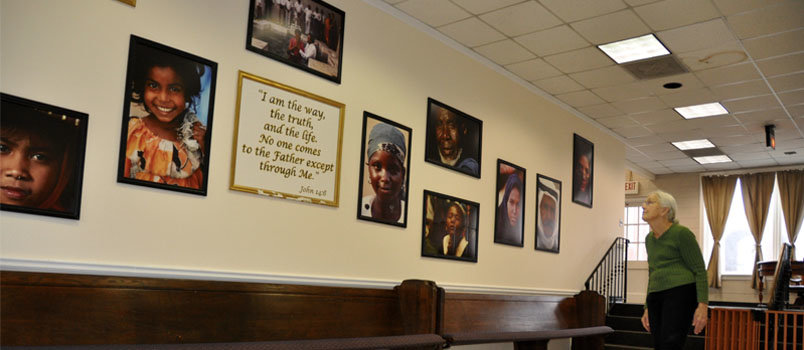 Pat Maddox looks over faces of some of the many refugees whose lives have been changed when Clarkston Baptist Church decided to stay in its transitional neighborhood to serve Christ. The photos are in the lobby of what is now Clarkston International Bible Church, which was formed in 2005 with a merger of the declining Anglo congregation and a Filipino and Nigerian congregation it was hosting. JOE WESTBURY/Index
Pat Maddox looks over faces of some of the many refugees whose lives have been changed when Clarkston Baptist Church decided to stay in its transitional neighborhood to serve Christ. The photos are in the lobby of what is now Clarkston International Bible Church, which was formed in 2005 with a merger of the declining Anglo congregation and a Filipino and Nigerian congregation it was hosting. JOE WESTBURY/IndexThis is the first of a three-part series on Pat Maddox, above, and how she came to found Friends of Refugees (FOR) over the course of a decade. A faith-based organization with 25 partner churches, FOR continues to house many of its ministries at Clarkston International Bible Church. Future installments will include an introduction to Friends of Refugees and an overview of its ministries. Recently, Clarkston International Bible Church and the North American Mission Board revealed a potential partnership to expand the church's ministry on a national platform.
CLARKSTON — How is the best way to be a missionary?
For Pat Maddox the answer was simple. You just put yourself in the shoes of the person you want to serve, understand his or her needs, and then meet those needs without expecting anything in return.
That was the genesis of Friends of Refugees and many other ministries now under its umbrella of servanthood at Clarkston International Bible Church.
It's notable that Maddox's call was largely tied to the decline of her own church and its struggle to find its footing in a transitional community.
Maddox’s earliest memories of the church are of a vibrant congregation with well-attended worship services and a full staff. Typical of many churches of the time, it was largely Anglo “with maybe a person or two of color here and there. But there were not many, to be sure,” she remembers.
Yet, within seven years that Camelot existence – open to ethnic diversity but preferring the status quo – quickly eroded and the church declined to about 75 members. The world was quickly changing and in doing so, coming to America. And Georgia. And more importantly, to Clarkston.
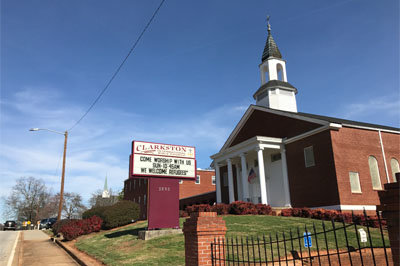 From 1996 to 2001, more than 19,000 refugees were resettled in Georgia, most of them in Clarkson. It brought change that challenged members of Clarkson Baptist Church to examine their commitment to biblical teachings such as suddenly ministering to the foreign mission field in their backyard. JOE WESTBURY/Index
From 1996 to 2001, more than 19,000 refugees were resettled in Georgia, most of them in Clarkson. It brought change that challenged members of Clarkson Baptist Church to examine their commitment to biblical teachings such as suddenly ministering to the foreign mission field in their backyard. JOE WESTBURY/IndexFirst, solidly middle-class African Americans moved into town. Clarkston First Baptist Church, the African American congregation, grew and began to rival her own church in size and outreach. In fact, its growth closely paralleled her own church's decline.
That caused some cultural discomfort – some members moved out of the community – but things settled down. However, it was agreed upon that things would never be the same again.
Then the next decade brought refugees and immigrants from the far corners of the world.
“If there was a war someplace you could rest assured that people from those areas would be resettled by the government in Clarkston,” she remembers.
“The Bosnians were the first ones I remember coming around 1992 when the war broke out. They were then followed by Croatians. Both were facing ethnic cleansing at the hands of the Serbians, who also eventually arrived."
And that mass influx was the last straw. It reactivated the exodus and long decline from the church’s pews.
But it wasn’t just the social change that caused the decline. Several factors came together in a very short time that cast the church into a very tenuous position.
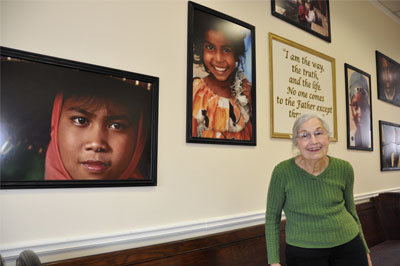 Pat Maddox saw the first influx of refugees into the Clarkston area back in the 90s as war raged in the former Yugoslavia area. Their impact on her, she says, is hard to define. m “[M]eeting these people, getting to know them, completely changed my outlook on life,” she says. JOE WESTBURY/Index[/caption]There was just too much change, too fast.
Pat Maddox saw the first influx of refugees into the Clarkston area back in the 90s as war raged in the former Yugoslavia area. Their impact on her, she says, is hard to define. m “[M]eeting these people, getting to know them, completely changed my outlook on life,” she says. JOE WESTBURY/Index[/caption]There was just too much change, too fast.
Maddox does not hide her Southern roots and admits she grew up in a prejudiced home. It’s just the way life was.
“But meeting these people, getting to know them, completely changed my outlook on life. Until then I was always polite but rather removed from very much conversation,” she recollects.
Looking further back into her past, she reflects on that early call to missions, thinking she would possibly serve on a foreign mission field – far from Clarkston. She did not realize someday that the foreign field would move into her neighborhood and she would be much older before she responded to that call.
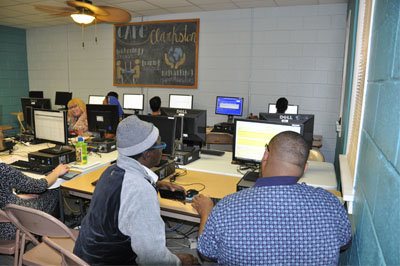 Cafe Clarkston, now known as Career Hub, teaches computer literacy. Maddox said the ministry was one of the first launched by former pastor Phil Kitchin as he sought to fill the most immediate need of refugees – job seeking via the Internet. JOE WESTBURY/Index[/caption]
Cafe Clarkston, now known as Career Hub, teaches computer literacy. Maddox said the ministry was one of the first launched by former pastor Phil Kitchin as he sought to fill the most immediate need of refugees – job seeking via the Internet. JOE WESTBURY/Index[/caption] That calling found herself taking baby steps in her own community. Those first steps saw her distributing food donated from Publix grocery from her car in the parking lot of Kristopher Woods Apartments. As soon as word spread, she was swamped with needy hands outstretched for sustenance.
It became necessary to develop an alphabetized system of distribution. Through it, people arrived at a pre-determined hour based on their building’s identification letter. Eventually she began operating out of her centrally-located home before moving the ministry to the church. Along the way she began driving a van to pick up children for the church. She continued to do so for a dozen years.
Maddox also helped start a Vacation Bible School. Soon, she had 80 children coming to hear about Jesus on the tennis courts at Kristopher Woods. Parents began attending to help with their children’s crafts and activities.
Adults soon began seeking her out, holding a sore jaw signaling a severe toothache or even an abscessed molar. Then, when the church began distributing donated furniture, others showed up – also with no grasp of the English language. Transactions were finalized through hand gestures. Children, quick to pick up conversational English, eased the communication somewhat and translated for their parents.
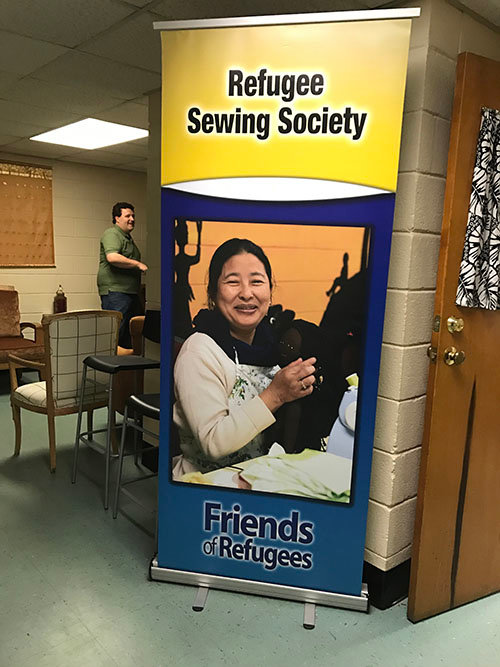 The Refugee Sewing Society, one of the ministries under Friends of Refugees founded by Maddox, serves refugee women who have fled genocide by providing an atmosphere for healing, an opportunity to express creativity, a means for building self-esteem, and a source of income. JOE WESTBURY/Index
The Refugee Sewing Society, one of the ministries under Friends of Refugees founded by Maddox, serves refugee women who have fled genocide by providing an atmosphere for healing, an opportunity to express creativity, a means for building self-esteem, and a source of income. JOE WESTBURY/IndexThen came the Kurds and groups from all parts of Africa. Sudan, Somalia, Eritrea, Burundi, Bantu Somalis (slaves to the dominant Somali population).
And that is when she launched a loose-knit ministry that began to take some organizational form in December 1995.
In 1999 she walked away from her nursing career of 36 years when the church acknowledged her as a missionary. She devoted herself to that long-delayed calling, stepping away from her salary and stepping out on faith. Then-pastor Phil Kitchin was instrumental in sharing her vision and working to incorporate refugees into the Kingdom and community.
Others began to notice the needs and pitched in to help. In 2005, First Baptist Church of Woodstock stepped in to help legally register that ministry as a non-profit. She named the outreach simply Friends of Refugees.
The church began a destination ministry site for churches wanting a multicultural missions experience. Many, such as Calvary Baptist Church in Winston-Salem, NC and Hunter Street Baptist Church in Birmingham, AL, stepped in to help.
In 2005 the 122-year-old Clarkston Baptist Church changed its identity by merging with its larger Filipino congregation and a Nigerian congregation to launch itself as Clarkston International Bible Church. Today about 150 members of the combined churches meet in a multicultural service at 10:45 a.m. In addition, the church is entering a ground-breaking partnership with the North American Mission Board that will bring it into the national spotlight.
“I loved the refugees and thought how hard it would be for me to be in their shoes, having to start a new life somewhere in which I did not understand the language, had to find a job and pay my own rent and buy groceries that I didn’t understand what was in the package … all within a few months of arriving," Maddox says.
Her ministry grew. She interpreted the simplest-to-most-difficult paperwork, became a listening ear, and carried children as well as their parents to the doctor.
“Whatever they needed, I and my volunteers – some from Northside Community Church, an Evangelical Free congregation that was already working in Bosnia – stepped in to be the face and hands of Christ,” she adds.
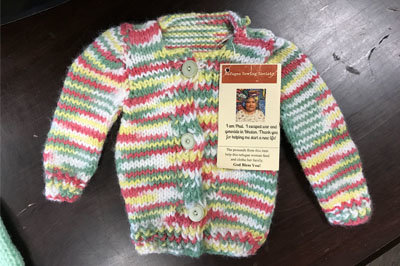 Infant and children's clothing made by refugee women help provide income their the ministry's store at Clarkson International Bible Church. JOE WESTBURY/Index
Infant and children's clothing made by refugee women help provide income their the ministry's store at Clarkson International Bible Church. JOE WESTBURY/IndexThe ministry has grown far beyond her wildest expectations as Clarkston Baptist Church embraced the change and provided space for new ethnic congregations to gather and learn about the Gospel in their heart language. Some grew and moved out, others still remain. Today seven congregations call the sprawling red-brick building their home: Atlanta Nepali Christian Church, Voices of Hope (Congolese), Karen Christian Fellowship (Burmese), Burmese Home Group Network, Sudanese Christian Missionary Church, Ray of Hope International Church (Bhutanese), and Vertical Life Church (Pakistani).
Friends of Refugees has now grown into a multi-faceted para-church ministry. Last year it operated a family of seven Christian community development programs with 25 partner churches and 13 full-time staff. Its footprint has grown to include a community garden for 95 families, the Refugee Sewing Society, youth programs, a summer camp, and job networking and technology assistance, among others. An overview of those ministries is slated to appear at christianindex.org soon.
Maddox is overwhelmed at how far the ministry has grown and how she was eventually able to fulfill that call to missions.
“Early in life I had always hoped to make an international missions trip but family and marriage and career obligations were just too demanding. Life was full,” she remembers.
Today her daughter says Maddox is “25 years old, going on 79” in July.
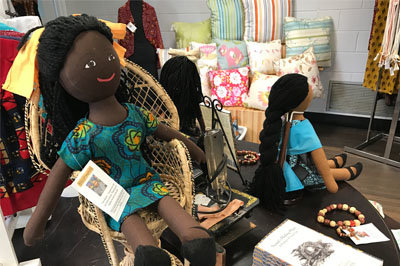 Dolls reflecting cultural diversity are among items being sold by refugee women in their store and on Etsy. JOE WESTBURY/Index
Dolls reflecting cultural diversity are among items being sold by refugee women in their store and on Etsy. JOE WESTBURY/IndexShe has since stepped aside from the day-to-day operations and turned over the leadership to a younger generation – but it remains true to its faith-based roots.
“This has blessed me more than anything I could have ever imagined. It is something totally outside of myself, sort of like God was moving pieces around a chessboard, putting all the pieces together as He made His moves.
She pauses for a second and looks back on the struggles of those early year. She sees how her seven loaves of bread and fish have been multiplied.
“Friends of Refugees has always been about finding a need and meeting it. And all of this was born out of the question, ‘What do you do when your congregation flees?”
Clarkston International Bible Church meets at 10:45 a.m. on Sunday at 3895 Church Street, Clarkston, GA 30021. Its office telephone number is (404) 296-6483. Trent DeLoach has served as pastor since February 2016, replacing longtime pastor Phil Kitchin, who retired.
Friends of Refugees is the umbrella organization of seven faith-based of ministries, many still housed at the church. For more information visit the website here to learn how to volunteer, donate, or serve as an intern. Its office telephone number is (404) 292-8818. Brian Bollinger has served as executive director since 2013.